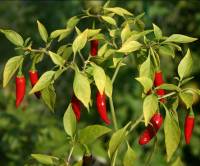Chilli
| Botanical Information |
| Order | Solanales |
| Family | Solanaceae |
| Genus | Capsicum |
| Common Name | Chilli |
| Species | |
Maturity days
Planting Months
| Planting months |
| Jan | Feb | Mar | Apr | May | Jun | Jul | Aug | Sep | Oct | Nov | Dec |
| | | | X | X | X | X | | | | | |
Permaculture uses
| Permaculture uses |
| Usage 1 | Usage 2 | Usage 3 |
| | Shade | Vegetable |
| Growing Condition | Comment |
| Drought Tolerant | Yes |
| Humidity tolerant | Yes |
| Planting area | Wicking_bed |
| Sunlight | Full_sun |
Photos
Small shrub. Can be perennial in NQ. Smaller chilli's are liked by birds
Space plants: 40 - 50 cm apart Compatible with (can grow beside): Best grown in a separate bed as chillis need plenty of light and air circulation. Small bushy plants. Dark green ovate leaves. Chilli need warm frost free weather, so protect with glass or plastic covers if planting outside in cooler areas. Most varieties need a long growing period to produce many fruit. There are many types of chilli. Some are more fiery than others. As a general rule, the smaller the pod the hotter the taste. Culinary hints - cooking and eating Chilli peppers Chillis freeze very well. Wash, dry, and free whole. Use them direct from the freezer (no need to defrost). Wear plastic gloves or wash your hands thoroughly after handling and cutting to avoid accidentally rubbing chilli juice onto your mouth or eyes!
